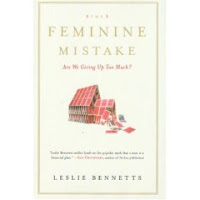
Last night’s host at the New York Public Library event primed the audience for a fight. There was none, just good ‘n lively convo. So I settled in and found myself listening to the exchange between Leslie Bennetts and Elissa Schappell with an ear for marketing. (I’m working on talking points for my own book and am obsessed with framing – can you tell?) Leslie Bennetts is a master, a natural — I say that with genuine admiration.
Some highlights from the sound bite frontlines:
-ES on mommy wars: “It’s mom-on-mom violence!”
-LB on SAHMs being left and being unable to reenter the workforce: “It’s carnage out there.”
-LB laughing at her own poor paraphrasing of an expert she talked to: “He who brings home the bacon controls the bacon.”
-LB on structure: “What’s keeping women from reentering the workforce is that no one is taking them back in.”
-LB going counterintuitive: “Staying at home is high-risk behavior. I wouldn’t put my child’s welfare at risk that way.” “Working women aren’t validated as good mothers. No one ever says working women are being good moms, taking care of their kids, by working.”
-LB on motive: “I did not think this was a book about mommy wars or feminism. Boy was I dumb.” ES: “Dumb, dumb, dumb!”
It’s interesting data to learn that many people seem not to be fully understanding “The Feminine Mistake” as a pun on “The Feminine Mystique,” and instead think that Bennetts is calling SAHMs mistakes. (Jury’s still out over here on that one – still on Chapter 1…)
Be sure to check out Rebecca Mead’s New Yorker review of Bennetts. Good stuff, and balanced. (Thanks, Helaine, for that heads up!) Mead is generally laudatory (and man, talk about a gorgeously written review). Based on what I heard last night, I sense I’m going to agree with her critiques:
[Bennetts] is short on answers for women whose budgets do not stretch to hiring a well-chosen private surrogate. And she seems impatient with anyone who has failed to find, as she has, the thrill of work, particularly work that grants a certain degree of child-friendly flexibility.
Mead does a great historical tour of the title and offers a smart compare/contrast with Friedan. When I grow up, I want to be Rebecca Mead. (Don’t we all?!).

